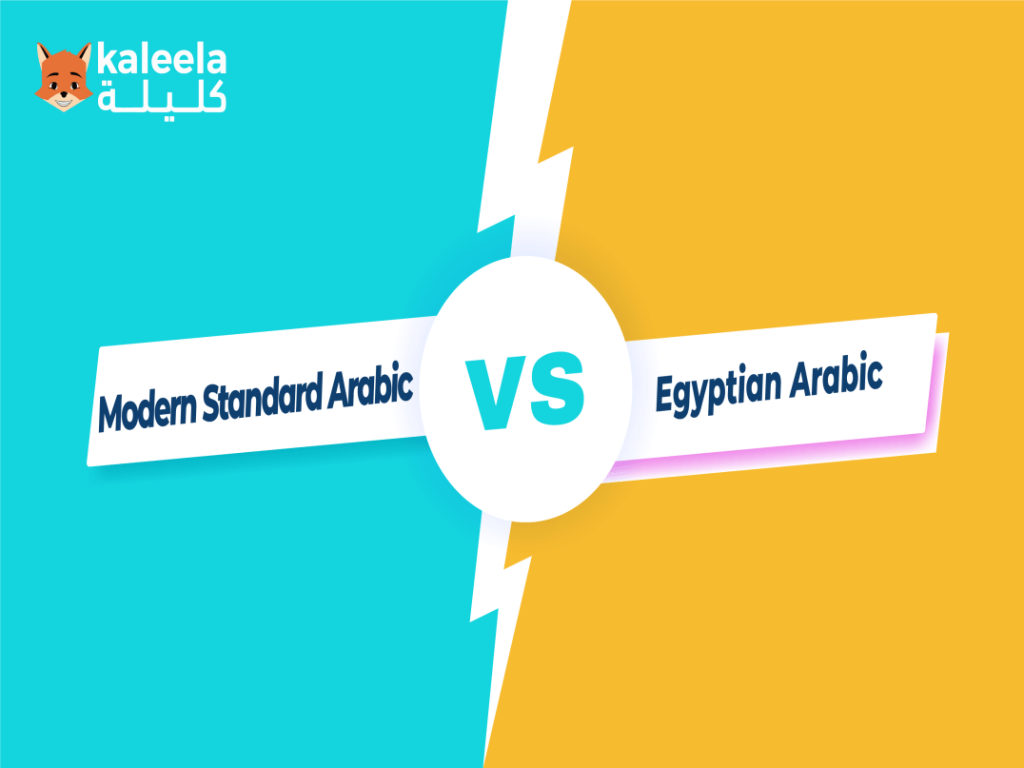Welcome to one of the most important decisions for any Arabic language learner: which variety should I learn? The world of Arabic is not a single entity, and understanding the difference between Modern Standard Arabic vs Egyptian Arabic is key to your success. While one is the formal language of books and news, the other is the vibrant, everyday language of a nation. This article will help you understand the nuances, answer the question of Egyptian Arabic vs Arabic, and clarify the role of Modern Standard Arabic as one of Egypt’s official languages
Modern Standard Arabic vs Egyptian Arabic: A Tale of Two Forms
The relationship between Modern Standard Arabic (MSA) and its many dialects is often described as diglossia. This means two versions of the same language are used by the same people for different purposes.
- Modern Standard Arabic (MSA): This is the formal, written, and widely understood form of Arabic. It’s the language of newspapers, books, political speeches, and news broadcasts across the entire Arab world. MSA is a unifying force, but it’s not typically used for casual, everyday conversation.
- Egyptian Arabic (ECA): This is the colloquial, spoken language of Egypt. It’s the dialect you’ll hear in homes, on the streets, in movies, and in popular music. Due to Egypt’s long-standing influence in media and entertainment, ECA is one of the most widely recognized and understood dialects across the Arab world.
So, when someone asks, “Egyptian Arabic vs Arabic,” the key is to remember that Egyptian Arabic is a form of Arabic, a widely spoken dialect that stands alongside the formal MSA.
Egypt’s Official Languages: Modern Standard Arabic
Despite the widespread use of the colloquial dialect, the official language of Egypt, as in all Arab countries, is Modern Standard Arabic. This means:
- All government documents, laws, and official communications are in MSA.
- Education is conducted in MSA, from primary school to university.
- Formal speeches, religious sermons, and news anchors on TV primarily use MSA.
This is why learners are often advised to have at least a basic understanding of MSA. It provides a foundational grammatical structure and vocabulary that can help you understand the formal side of the Arab world, even as you focus on a dialect for conversation.
Key Differences: Modern Standard Arabic vs Egyptian Arabic
While they are two forms of the same language, there are significant differences between Modern Standard Arabic vs Egyptian Arabic that every learner should know.
- Pronunciation: ECA has distinct phonetic shifts. For example, the letter Jeem (ج) is often pronounced as a hard “g” (like in “go”) rather than the “j” sound of MSA. The letter Qaf (ق) is frequently pronounced as a glottal stop.
- Vocabulary: While they share many core words, ECA has a large number of unique words and expressions. It has also been influenced by other languages like Coptic, Turkish, and French.
- Grammar: ECA has a simplified grammatical structure for everyday conversation. For instance, grammatical case endings (the vowels at the end of nouns) are generally dropped in spoken ECA. The way verbs are conjugated and tenses are formed can also differ from MSA.
| Feature | Modern Standard Arabic (MSA) | Egyptian Arabic (ECA) |
|---|---|---|
| Use | Formal, written, official | Everyday, spoken, informal |
| Pronunciation | More classic and formal | Phonetic shifts, often less guttural |
| Grammar | Complete, with case endings | Simplified, case endings dropped |
| Vocabulary | Formal, unifying | Unique colloquialisms |
| Media | News, formal literature | Movies, TV shows, music |
Which Should You Learn? A Guide for Learners
The best approach is often a combination.
- Start with MSA: Many experts recommend starting with MSA to build a solid grammatical foundation and learn the formal rules.
- Focus on a Dialect: Once you have a basic grasp of MSA, choose a dialect based on your goals. If you want to communicate with a huge number of people and access a wealth of media, Egyptian Arabic is an excellent choice.
Understanding the relationship between Modern Standard Arabic vs Egyptian Arabic is not a choice between one or the other but rather an understanding of their distinct roles. Knowing both gives you the ability to read a newspaper and also talk to the person next to you on the bus.
Ready to start your journey into this fascinating language? Download the Kaleela Arabic learning app today! Our comprehensive lessons help you master the fundamentals of Modern Standard Arabic and a variety of dialects, including Egyptian Arabic, to help you communicate confidently and fluently.



